Business Law: Case Study on Contract Law Elements and Legal Analysis
VerifiedAdded on 2023/04/21
|11
|2326
|365
Case Study
AI Summary
This business law assignment presents a case study involving Manisha, who sought to lease a property from her mother for her designer clothing retail outlet. The central issue revolves around whether a legally binding contract was formed between Manisha and her mother. Manisha offered to lease the property at half the regular price and invested in renovations, anticipating her mother's consent. However, her mother later decided to lease the property to a third party for double the rent. The analysis examines the elements of a valid contract, including offer, acceptance, consideration, and the intention to create legal relations, particularly in the context of a domestic agreement. Applying relevant case laws such as Harvey v Facey, Chappell v Nestle, Jones v Padavatton, Albert v MIB, and Felthouse v Bindley, the study concludes that no contract was formed due to the absence of acceptance from Manisha's mother. Consequently, Manisha has no legal recourse against her mother and cannot claim damages. Desklib provides this and other solved assignments to aid students in their studies.
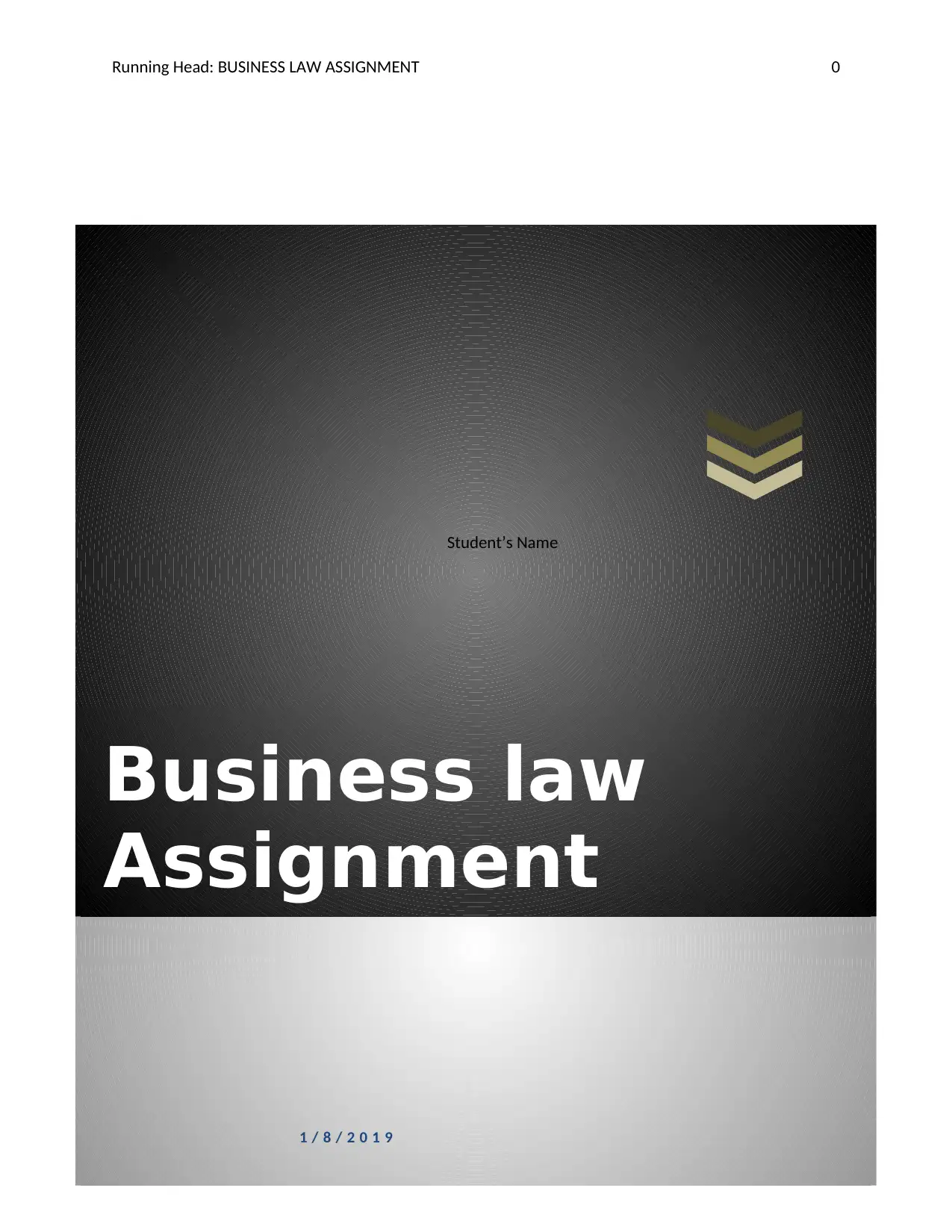
Business law
Assignment
Running Head: BUSINESS LAW ASSIGNMENT 0
1 / 8 / 2 0 1 9
Student’s Name
Assignment
Running Head: BUSINESS LAW ASSIGNMENT 0
1 / 8 / 2 0 1 9
Student’s Name
Paraphrase This Document
Need a fresh take? Get an instant paraphrase of this document with our AI Paraphraser
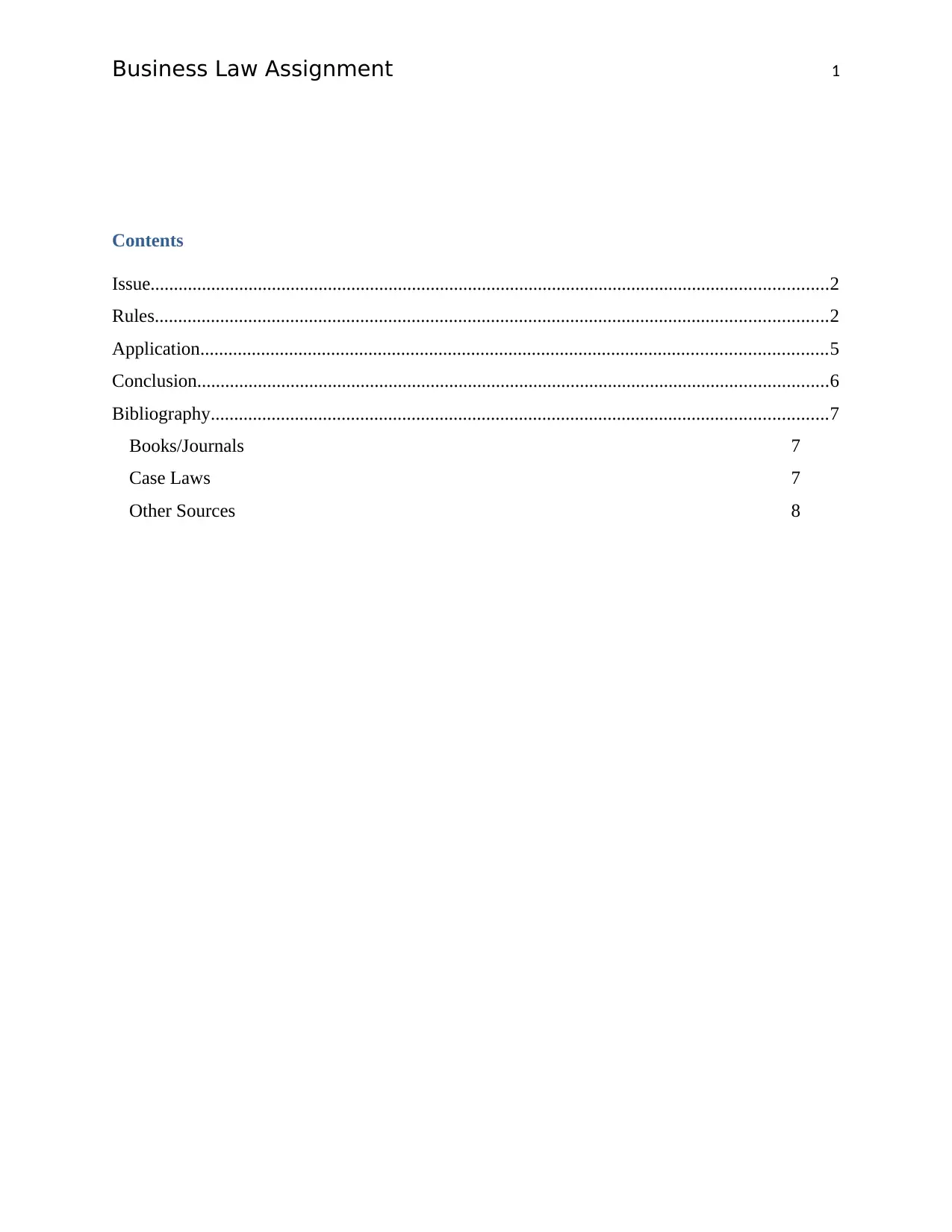
Business Law Assignment 1
Contents
Issue.................................................................................................................................................2
Rules................................................................................................................................................2
Application......................................................................................................................................5
Conclusion.......................................................................................................................................6
Bibliography....................................................................................................................................7
Books/Journals 7
Case Laws 7
Other Sources 8
Contents
Issue.................................................................................................................................................2
Rules................................................................................................................................................2
Application......................................................................................................................................5
Conclusion.......................................................................................................................................6
Bibliography....................................................................................................................................7
Books/Journals 7
Case Laws 7
Other Sources 8
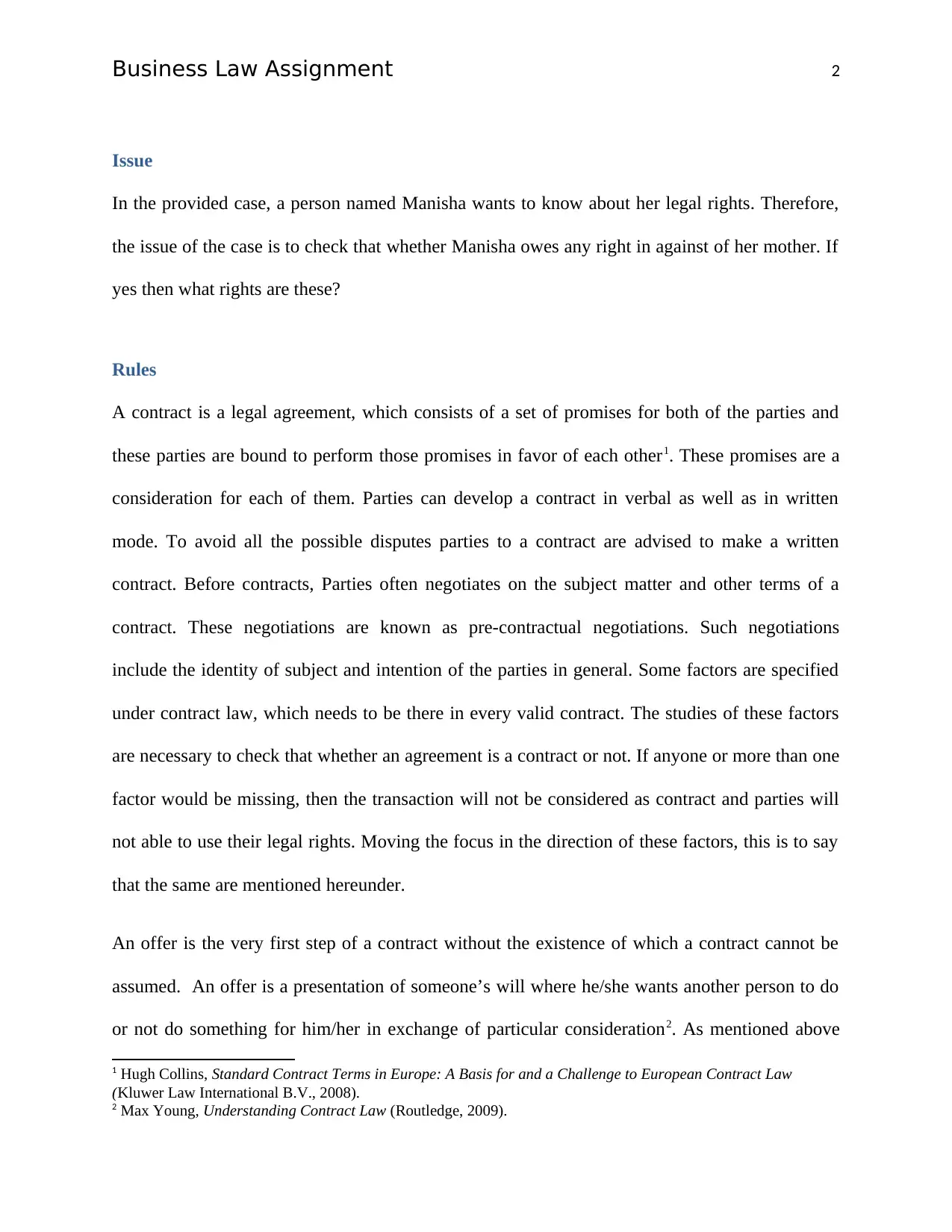
Business Law Assignment 2
Issue
In the provided case, a person named Manisha wants to know about her legal rights. Therefore,
the issue of the case is to check that whether Manisha owes any right in against of her mother. If
yes then what rights are these?
Rules
A contract is a legal agreement, which consists of a set of promises for both of the parties and
these parties are bound to perform those promises in favor of each other1. These promises are a
consideration for each of them. Parties can develop a contract in verbal as well as in written
mode. To avoid all the possible disputes parties to a contract are advised to make a written
contract. Before contracts, Parties often negotiates on the subject matter and other terms of a
contract. These negotiations are known as pre-contractual negotiations. Such negotiations
include the identity of subject and intention of the parties in general. Some factors are specified
under contract law, which needs to be there in every valid contract. The studies of these factors
are necessary to check that whether an agreement is a contract or not. If anyone or more than one
factor would be missing, then the transaction will not be considered as contract and parties will
not able to use their legal rights. Moving the focus in the direction of these factors, this is to say
that the same are mentioned hereunder.
An offer is the very first step of a contract without the existence of which a contract cannot be
assumed. An offer is a presentation of someone’s will where he/she wants another person to do
or not do something for him/her in exchange of particular consideration2. As mentioned above
1 Hugh Collins, Standard Contract Terms in Europe: A Basis for and a Challenge to European Contract Law
(Kluwer Law International B.V., 2008).
2 Max Young, Understanding Contract Law (Routledge, 2009).
Issue
In the provided case, a person named Manisha wants to know about her legal rights. Therefore,
the issue of the case is to check that whether Manisha owes any right in against of her mother. If
yes then what rights are these?
Rules
A contract is a legal agreement, which consists of a set of promises for both of the parties and
these parties are bound to perform those promises in favor of each other1. These promises are a
consideration for each of them. Parties can develop a contract in verbal as well as in written
mode. To avoid all the possible disputes parties to a contract are advised to make a written
contract. Before contracts, Parties often negotiates on the subject matter and other terms of a
contract. These negotiations are known as pre-contractual negotiations. Such negotiations
include the identity of subject and intention of the parties in general. Some factors are specified
under contract law, which needs to be there in every valid contract. The studies of these factors
are necessary to check that whether an agreement is a contract or not. If anyone or more than one
factor would be missing, then the transaction will not be considered as contract and parties will
not able to use their legal rights. Moving the focus in the direction of these factors, this is to say
that the same are mentioned hereunder.
An offer is the very first step of a contract without the existence of which a contract cannot be
assumed. An offer is a presentation of someone’s will where he/she wants another person to do
or not do something for him/her in exchange of particular consideration2. As mentioned above
1 Hugh Collins, Standard Contract Terms in Europe: A Basis for and a Challenge to European Contract Law
(Kluwer Law International B.V., 2008).
2 Max Young, Understanding Contract Law (Routledge, 2009).
⊘ This is a preview!⊘
Do you want full access?
Subscribe today to unlock all pages.

Trusted by 1+ million students worldwide
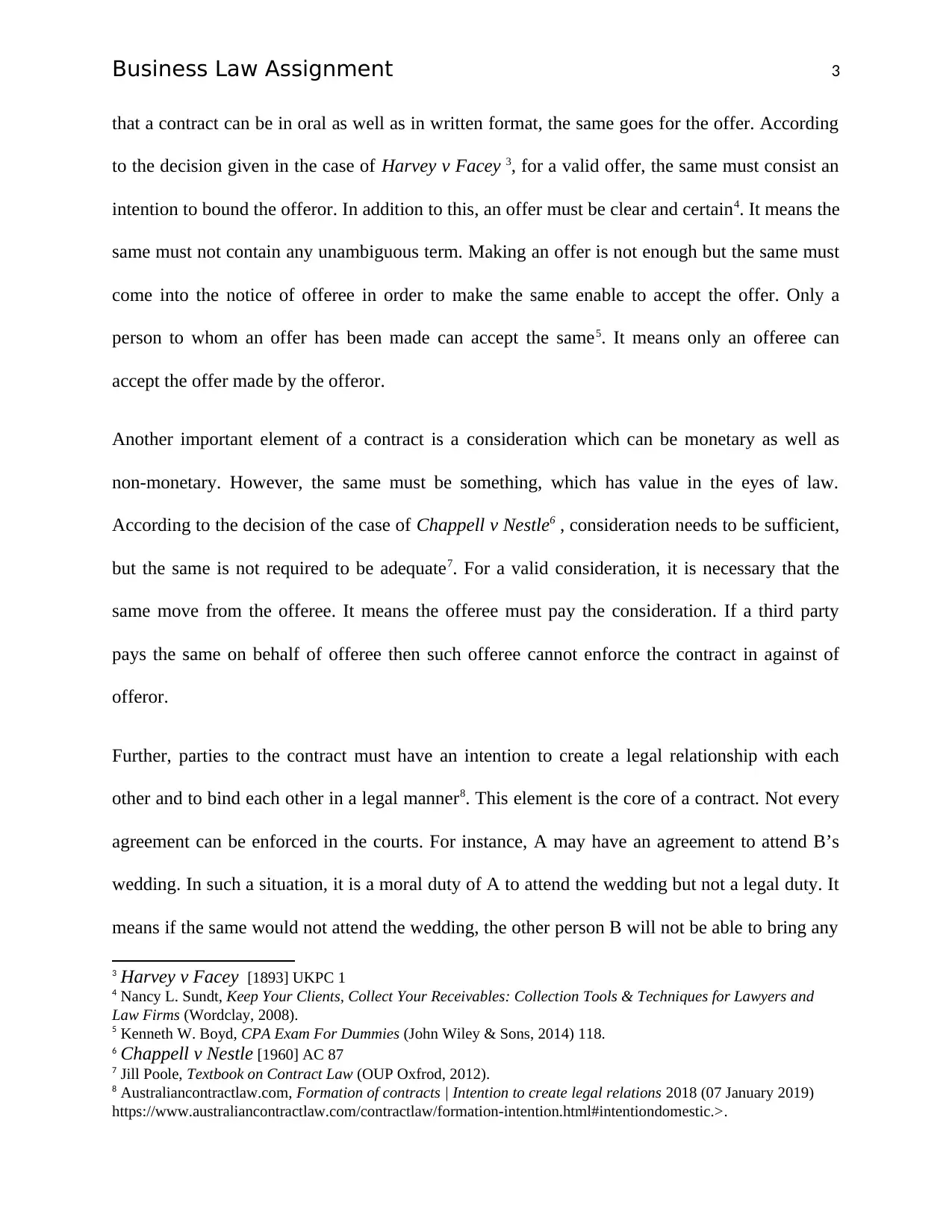
Business Law Assignment 3
that a contract can be in oral as well as in written format, the same goes for the offer. According
to the decision given in the case of Harvey v Facey 3, for a valid offer, the same must consist an
intention to bound the offeror. In addition to this, an offer must be clear and certain4. It means the
same must not contain any unambiguous term. Making an offer is not enough but the same must
come into the notice of offeree in order to make the same enable to accept the offer. Only a
person to whom an offer has been made can accept the same5. It means only an offeree can
accept the offer made by the offeror.
Another important element of a contract is a consideration which can be monetary as well as
non-monetary. However, the same must be something, which has value in the eyes of law.
According to the decision of the case of Chappell v Nestle6 , consideration needs to be sufficient,
but the same is not required to be adequate7. For a valid consideration, it is necessary that the
same move from the offeree. It means the offeree must pay the consideration. If a third party
pays the same on behalf of offeree then such offeree cannot enforce the contract in against of
offeror.
Further, parties to the contract must have an intention to create a legal relationship with each
other and to bind each other in a legal manner8. This element is the core of a contract. Not every
agreement can be enforced in the courts. For instance, A may have an agreement to attend B’s
wedding. In such a situation, it is a moral duty of A to attend the wedding but not a legal duty. It
means if the same would not attend the wedding, the other person B will not be able to bring any
3 Harvey v Facey [1893] UKPC 1
4 Nancy L. Sundt, Keep Your Clients, Collect Your Receivables: Collection Tools & Techniques for Lawyers and
Law Firms (Wordclay, 2008).
5 Kenneth W. Boyd, CPA Exam For Dummies (John Wiley & Sons, 2014) 118.
6 Chappell v Nestle [1960] AC 87
7 Jill Poole, Textbook on Contract Law (OUP Oxfrod, 2012).
8 Australiancontractlaw.com, Formation of contracts | Intention to create legal relations 2018 (07 January 2019)
https://www.australiancontractlaw.com/contractlaw/formation-intention.html#intentiondomestic.>.
that a contract can be in oral as well as in written format, the same goes for the offer. According
to the decision given in the case of Harvey v Facey 3, for a valid offer, the same must consist an
intention to bound the offeror. In addition to this, an offer must be clear and certain4. It means the
same must not contain any unambiguous term. Making an offer is not enough but the same must
come into the notice of offeree in order to make the same enable to accept the offer. Only a
person to whom an offer has been made can accept the same5. It means only an offeree can
accept the offer made by the offeror.
Another important element of a contract is a consideration which can be monetary as well as
non-monetary. However, the same must be something, which has value in the eyes of law.
According to the decision of the case of Chappell v Nestle6 , consideration needs to be sufficient,
but the same is not required to be adequate7. For a valid consideration, it is necessary that the
same move from the offeree. It means the offeree must pay the consideration. If a third party
pays the same on behalf of offeree then such offeree cannot enforce the contract in against of
offeror.
Further, parties to the contract must have an intention to create a legal relationship with each
other and to bind each other in a legal manner8. This element is the core of a contract. Not every
agreement can be enforced in the courts. For instance, A may have an agreement to attend B’s
wedding. In such a situation, it is a moral duty of A to attend the wedding but not a legal duty. It
means if the same would not attend the wedding, the other person B will not be able to bring any
3 Harvey v Facey [1893] UKPC 1
4 Nancy L. Sundt, Keep Your Clients, Collect Your Receivables: Collection Tools & Techniques for Lawyers and
Law Firms (Wordclay, 2008).
5 Kenneth W. Boyd, CPA Exam For Dummies (John Wiley & Sons, 2014) 118.
6 Chappell v Nestle [1960] AC 87
7 Jill Poole, Textbook on Contract Law (OUP Oxfrod, 2012).
8 Australiancontractlaw.com, Formation of contracts | Intention to create legal relations 2018 (07 January 2019)
https://www.australiancontractlaw.com/contractlaw/formation-intention.html#intentiondomestic.>.
Paraphrase This Document
Need a fresh take? Get an instant paraphrase of this document with our AI Paraphraser
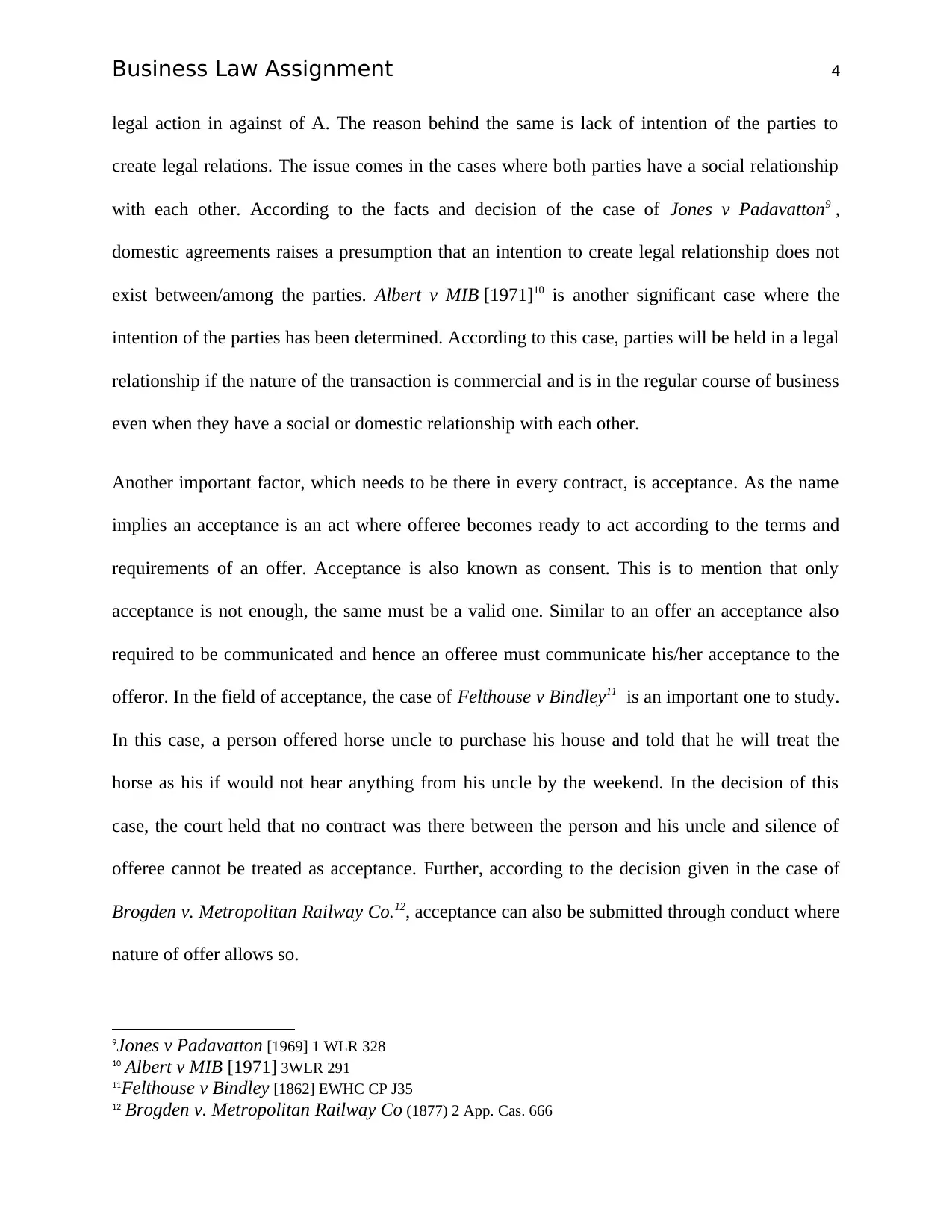
Business Law Assignment 4
legal action in against of A. The reason behind the same is lack of intention of the parties to
create legal relations. The issue comes in the cases where both parties have a social relationship
with each other. According to the facts and decision of the case of Jones v Padavatton9 ,
domestic agreements raises a presumption that an intention to create legal relationship does not
exist between/among the parties. Albert v MIB [1971]10 is another significant case where the
intention of the parties has been determined. According to this case, parties will be held in a legal
relationship if the nature of the transaction is commercial and is in the regular course of business
even when they have a social or domestic relationship with each other.
Another important factor, which needs to be there in every contract, is acceptance. As the name
implies an acceptance is an act where offeree becomes ready to act according to the terms and
requirements of an offer. Acceptance is also known as consent. This is to mention that only
acceptance is not enough, the same must be a valid one. Similar to an offer an acceptance also
required to be communicated and hence an offeree must communicate his/her acceptance to the
offeror. In the field of acceptance, the case of Felthouse v Bindley11 is an important one to study.
In this case, a person offered horse uncle to purchase his house and told that he will treat the
horse as his if would not hear anything from his uncle by the weekend. In the decision of this
case, the court held that no contract was there between the person and his uncle and silence of
offeree cannot be treated as acceptance. Further, according to the decision given in the case of
Brogden v. Metropolitan Railway Co.12, acceptance can also be submitted through conduct where
nature of offer allows so.
9Jones v Padavatton [1969] 1 WLR 328
10 Albert v MIB [1971] 3WLR 291
11Felthouse v Bindley [1862] EWHC CP J35
12 Brogden v. Metropolitan Railway Co (1877) 2 App. Cas. 666
legal action in against of A. The reason behind the same is lack of intention of the parties to
create legal relations. The issue comes in the cases where both parties have a social relationship
with each other. According to the facts and decision of the case of Jones v Padavatton9 ,
domestic agreements raises a presumption that an intention to create legal relationship does not
exist between/among the parties. Albert v MIB [1971]10 is another significant case where the
intention of the parties has been determined. According to this case, parties will be held in a legal
relationship if the nature of the transaction is commercial and is in the regular course of business
even when they have a social or domestic relationship with each other.
Another important factor, which needs to be there in every contract, is acceptance. As the name
implies an acceptance is an act where offeree becomes ready to act according to the terms and
requirements of an offer. Acceptance is also known as consent. This is to mention that only
acceptance is not enough, the same must be a valid one. Similar to an offer an acceptance also
required to be communicated and hence an offeree must communicate his/her acceptance to the
offeror. In the field of acceptance, the case of Felthouse v Bindley11 is an important one to study.
In this case, a person offered horse uncle to purchase his house and told that he will treat the
horse as his if would not hear anything from his uncle by the weekend. In the decision of this
case, the court held that no contract was there between the person and his uncle and silence of
offeree cannot be treated as acceptance. Further, according to the decision given in the case of
Brogden v. Metropolitan Railway Co.12, acceptance can also be submitted through conduct where
nature of offer allows so.
9Jones v Padavatton [1969] 1 WLR 328
10 Albert v MIB [1971] 3WLR 291
11Felthouse v Bindley [1862] EWHC CP J35
12 Brogden v. Metropolitan Railway Co (1877) 2 App. Cas. 666
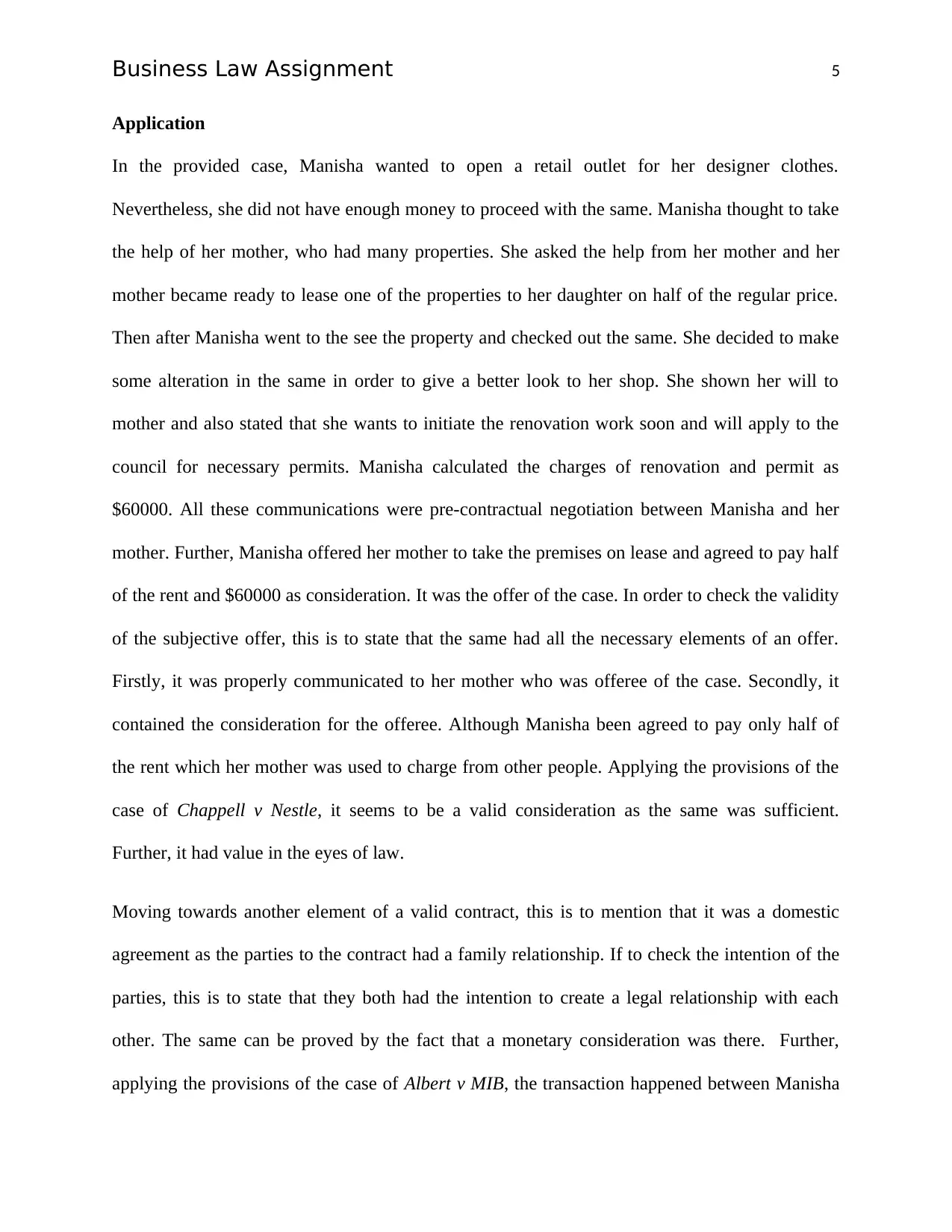
Business Law Assignment 5
Application
In the provided case, Manisha wanted to open a retail outlet for her designer clothes.
Nevertheless, she did not have enough money to proceed with the same. Manisha thought to take
the help of her mother, who had many properties. She asked the help from her mother and her
mother became ready to lease one of the properties to her daughter on half of the regular price.
Then after Manisha went to the see the property and checked out the same. She decided to make
some alteration in the same in order to give a better look to her shop. She shown her will to
mother and also stated that she wants to initiate the renovation work soon and will apply to the
council for necessary permits. Manisha calculated the charges of renovation and permit as
$60000. All these communications were pre-contractual negotiation between Manisha and her
mother. Further, Manisha offered her mother to take the premises on lease and agreed to pay half
of the rent and $60000 as consideration. It was the offer of the case. In order to check the validity
of the subjective offer, this is to state that the same had all the necessary elements of an offer.
Firstly, it was properly communicated to her mother who was offeree of the case. Secondly, it
contained the consideration for the offeree. Although Manisha been agreed to pay only half of
the rent which her mother was used to charge from other people. Applying the provisions of the
case of Chappell v Nestle, it seems to be a valid consideration as the same was sufficient.
Further, it had value in the eyes of law.
Moving towards another element of a valid contract, this is to mention that it was a domestic
agreement as the parties to the contract had a family relationship. If to check the intention of the
parties, this is to state that they both had the intention to create a legal relationship with each
other. The same can be proved by the fact that a monetary consideration was there. Further,
applying the provisions of the case of Albert v MIB, the transaction happened between Manisha
Application
In the provided case, Manisha wanted to open a retail outlet for her designer clothes.
Nevertheless, she did not have enough money to proceed with the same. Manisha thought to take
the help of her mother, who had many properties. She asked the help from her mother and her
mother became ready to lease one of the properties to her daughter on half of the regular price.
Then after Manisha went to the see the property and checked out the same. She decided to make
some alteration in the same in order to give a better look to her shop. She shown her will to
mother and also stated that she wants to initiate the renovation work soon and will apply to the
council for necessary permits. Manisha calculated the charges of renovation and permit as
$60000. All these communications were pre-contractual negotiation between Manisha and her
mother. Further, Manisha offered her mother to take the premises on lease and agreed to pay half
of the rent and $60000 as consideration. It was the offer of the case. In order to check the validity
of the subjective offer, this is to state that the same had all the necessary elements of an offer.
Firstly, it was properly communicated to her mother who was offeree of the case. Secondly, it
contained the consideration for the offeree. Although Manisha been agreed to pay only half of
the rent which her mother was used to charge from other people. Applying the provisions of the
case of Chappell v Nestle, it seems to be a valid consideration as the same was sufficient.
Further, it had value in the eyes of law.
Moving towards another element of a valid contract, this is to mention that it was a domestic
agreement as the parties to the contract had a family relationship. If to check the intention of the
parties, this is to state that they both had the intention to create a legal relationship with each
other. The same can be proved by the fact that a monetary consideration was there. Further,
applying the provisions of the case of Albert v MIB, the transaction happened between Manisha
⊘ This is a preview!⊘
Do you want full access?
Subscribe today to unlock all pages.

Trusted by 1+ million students worldwide
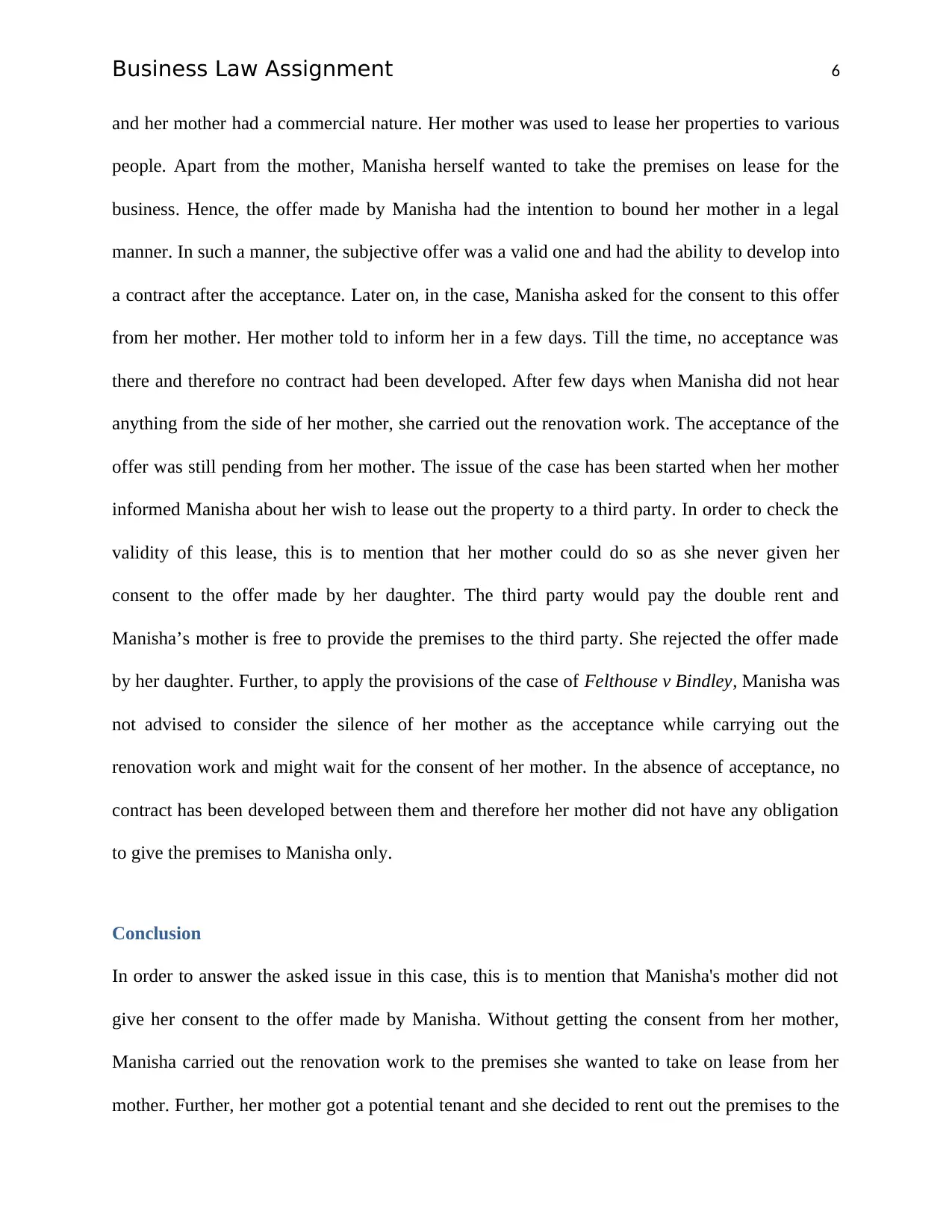
Business Law Assignment 6
and her mother had a commercial nature. Her mother was used to lease her properties to various
people. Apart from the mother, Manisha herself wanted to take the premises on lease for the
business. Hence, the offer made by Manisha had the intention to bound her mother in a legal
manner. In such a manner, the subjective offer was a valid one and had the ability to develop into
a contract after the acceptance. Later on, in the case, Manisha asked for the consent to this offer
from her mother. Her mother told to inform her in a few days. Till the time, no acceptance was
there and therefore no contract had been developed. After few days when Manisha did not hear
anything from the side of her mother, she carried out the renovation work. The acceptance of the
offer was still pending from her mother. The issue of the case has been started when her mother
informed Manisha about her wish to lease out the property to a third party. In order to check the
validity of this lease, this is to mention that her mother could do so as she never given her
consent to the offer made by her daughter. The third party would pay the double rent and
Manisha’s mother is free to provide the premises to the third party. She rejected the offer made
by her daughter. Further, to apply the provisions of the case of Felthouse v Bindley, Manisha was
not advised to consider the silence of her mother as the acceptance while carrying out the
renovation work and might wait for the consent of her mother. In the absence of acceptance, no
contract has been developed between them and therefore her mother did not have any obligation
to give the premises to Manisha only.
Conclusion
In order to answer the asked issue in this case, this is to mention that Manisha's mother did not
give her consent to the offer made by Manisha. Without getting the consent from her mother,
Manisha carried out the renovation work to the premises she wanted to take on lease from her
mother. Further, her mother got a potential tenant and she decided to rent out the premises to the
and her mother had a commercial nature. Her mother was used to lease her properties to various
people. Apart from the mother, Manisha herself wanted to take the premises on lease for the
business. Hence, the offer made by Manisha had the intention to bound her mother in a legal
manner. In such a manner, the subjective offer was a valid one and had the ability to develop into
a contract after the acceptance. Later on, in the case, Manisha asked for the consent to this offer
from her mother. Her mother told to inform her in a few days. Till the time, no acceptance was
there and therefore no contract had been developed. After few days when Manisha did not hear
anything from the side of her mother, she carried out the renovation work. The acceptance of the
offer was still pending from her mother. The issue of the case has been started when her mother
informed Manisha about her wish to lease out the property to a third party. In order to check the
validity of this lease, this is to mention that her mother could do so as she never given her
consent to the offer made by her daughter. The third party would pay the double rent and
Manisha’s mother is free to provide the premises to the third party. She rejected the offer made
by her daughter. Further, to apply the provisions of the case of Felthouse v Bindley, Manisha was
not advised to consider the silence of her mother as the acceptance while carrying out the
renovation work and might wait for the consent of her mother. In the absence of acceptance, no
contract has been developed between them and therefore her mother did not have any obligation
to give the premises to Manisha only.
Conclusion
In order to answer the asked issue in this case, this is to mention that Manisha's mother did not
give her consent to the offer made by Manisha. Without getting the consent from her mother,
Manisha carried out the renovation work to the premises she wanted to take on lease from her
mother. Further, her mother got a potential tenant and she decided to rent out the premises to the
Paraphrase This Document
Need a fresh take? Get an instant paraphrase of this document with our AI Paraphraser

Business Law Assignment 7
third person rejecting the offer of Manisha. As the consent was missing, no contract was
developed between Manisha and her mother. Now, Manisha does not have any right against her
mother, and she cannot ask her mother to provide the decided premises. Further, she also cannot
ask for any damages.
third person rejecting the offer of Manisha. As the consent was missing, no contract was
developed between Manisha and her mother. Now, Manisha does not have any right against her
mother, and she cannot ask her mother to provide the decided premises. Further, she also cannot
ask for any damages.
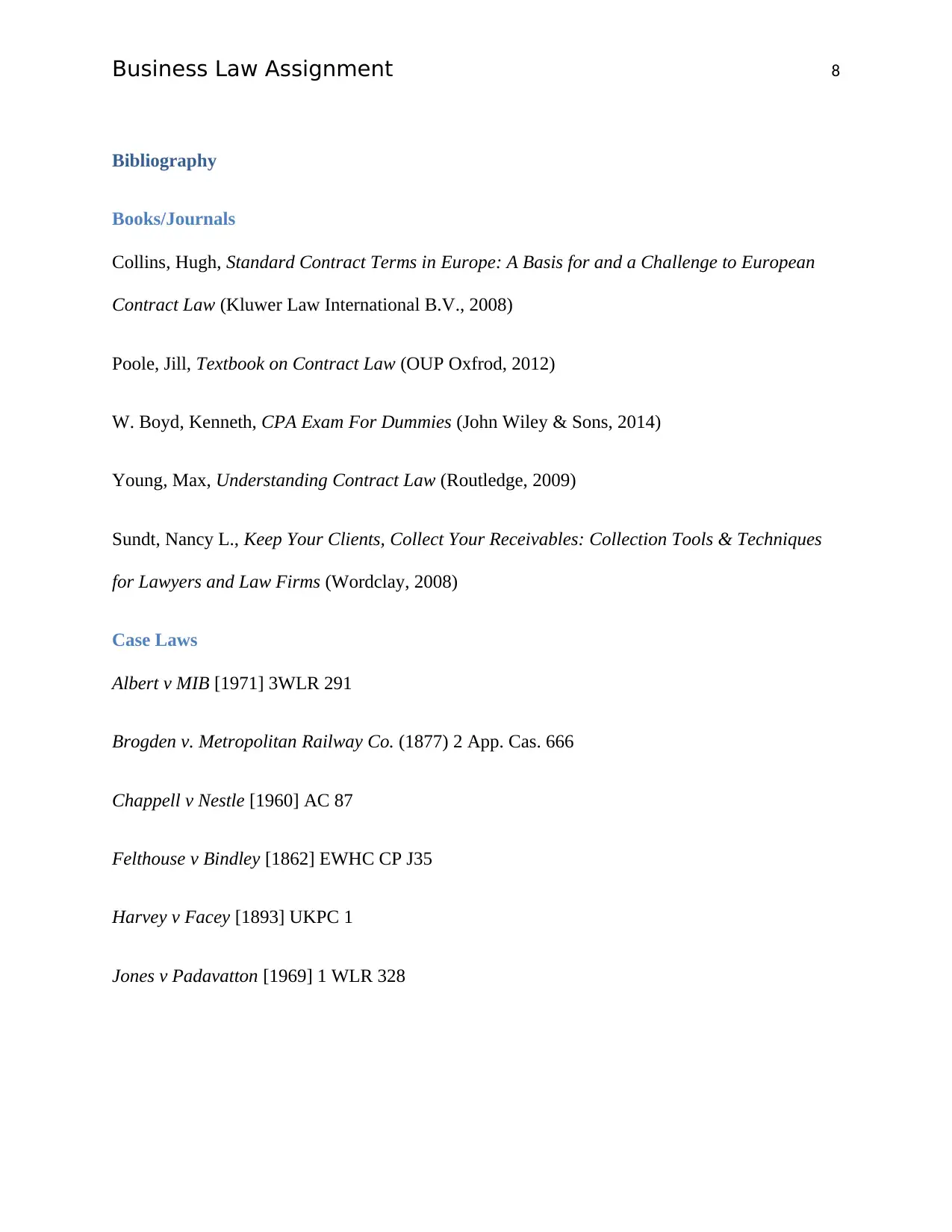
Business Law Assignment 8
Bibliography
Books/Journals
Collins, Hugh, Standard Contract Terms in Europe: A Basis for and a Challenge to European
Contract Law (Kluwer Law International B.V., 2008)
Poole, Jill, Textbook on Contract Law (OUP Oxfrod, 2012)
W. Boyd, Kenneth, CPA Exam For Dummies (John Wiley & Sons, 2014)
Young, Max, Understanding Contract Law (Routledge, 2009)
Sundt, Nancy L., Keep Your Clients, Collect Your Receivables: Collection Tools & Techniques
for Lawyers and Law Firms (Wordclay, 2008)
Case Laws
Albert v MIB [1971] 3WLR 291
Brogden v. Metropolitan Railway Co. (1877) 2 App. Cas. 666
Chappell v Nestle [1960] AC 87
Felthouse v Bindley [1862] EWHC CP J35
Harvey v Facey [1893] UKPC 1
Jones v Padavatton [1969] 1 WLR 328
Bibliography
Books/Journals
Collins, Hugh, Standard Contract Terms in Europe: A Basis for and a Challenge to European
Contract Law (Kluwer Law International B.V., 2008)
Poole, Jill, Textbook on Contract Law (OUP Oxfrod, 2012)
W. Boyd, Kenneth, CPA Exam For Dummies (John Wiley & Sons, 2014)
Young, Max, Understanding Contract Law (Routledge, 2009)
Sundt, Nancy L., Keep Your Clients, Collect Your Receivables: Collection Tools & Techniques
for Lawyers and Law Firms (Wordclay, 2008)
Case Laws
Albert v MIB [1971] 3WLR 291
Brogden v. Metropolitan Railway Co. (1877) 2 App. Cas. 666
Chappell v Nestle [1960] AC 87
Felthouse v Bindley [1862] EWHC CP J35
Harvey v Facey [1893] UKPC 1
Jones v Padavatton [1969] 1 WLR 328
⊘ This is a preview!⊘
Do you want full access?
Subscribe today to unlock all pages.

Trusted by 1+ million students worldwide

Business Law Assignment 9
Other Sources
Australiancontractlaw.com, Formation of contracts | Intention to create legal relations 2018 (07 January
2019) https://www.australiancontractlaw.com/contractlaw/formation-intention.html#intentiondomestic.>.
Other Sources
Australiancontractlaw.com, Formation of contracts | Intention to create legal relations 2018 (07 January
2019) https://www.australiancontractlaw.com/contractlaw/formation-intention.html#intentiondomestic.>.
Paraphrase This Document
Need a fresh take? Get an instant paraphrase of this document with our AI Paraphraser

Business Law Assignment 10
1 out of 11
Related Documents
Your All-in-One AI-Powered Toolkit for Academic Success.
+13062052269
info@desklib.com
Available 24*7 on WhatsApp / Email
![[object Object]](/_next/static/media/star-bottom.7253800d.svg)
Unlock your academic potential
Copyright © 2020–2025 A2Z Services. All Rights Reserved. Developed and managed by ZUCOL.


